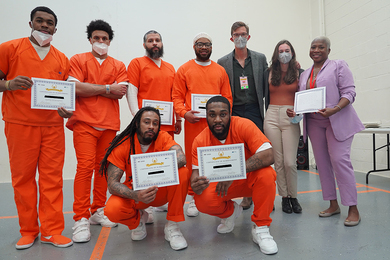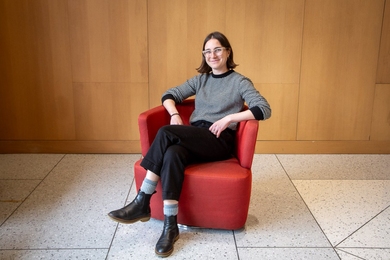Of the 100 types of human cancers, colon cancer is one of the top killers. The Catherine N. Stratton Lecture Series seminar on April 13, "On Aging Gracefully," looked at this disease, which is most common in people over age 65 but can strike young adults as well.
Dr. William M. Kettyle, an internist, geriatrician and associate director of the MIT Medical Department, used a case study of a 42-year-old man with a family history of colon cancer to focus on the detection, prevention and treatment of the disease.
The asymptomatic man, who was found to have a curable cancer of the colon, has a child, which raised issues about the transmission of the susceptibility for development of colon cancer.
The panelists were Dr. William C. Hahn, medical oncologist and cancer researcher at the Whitehead Institute and Dana-Farber Cancer Institute; Dr. Frederick P. Li, research physician and epidemiologist at Harvard Medical School, Harvard School of Public Health and Dana-Farber; and Dr. Helen M. Shields, gastroenterologist at Beth Israel Deaconess Medical Center and assistant professor of medicine at Harvard Medical School.
Dr. Shields said that of the 140,000 cases of colon cancer reported in the United States each year, 110,000 are in people aged 65 or older. The screening that has become a routine part of medical exams can make a big difference in catching the disease early enough for successful treatment, she said. Even experienced doctors and technicians can miss as many as 20 percent of their patients' lesions, which colonoscopies can detect.
A "virtual colonoscopy" currently being developed will not replace conventional procedures anytime soon, Dr. Shields said, although this CAT-scan-like device holds great promise as a future screening technique and has been quite promising in catching bigger polyps.
CATCHING IT EARLY
Colon cancer is a slow-growing disease that can take five to 10 years to show itself. The panelists said that prevention and catching cancers early are key.
"Historically, we focus on treating patients after they are sick," said Dr. Li. "Even more important is to prevent the occurrence of cancer." He said that while doctors agree that a healthy diet is important in preventing colon cancer, they do not agree on what constitutes a healthy diet beyond basics such as eating plenty of fruits and vegetables and limiting animal fat, excess salt and alcohol. While smoking is known to cause cancers of the respiratory system, he said there are some indications that it may contribute to colon cancer as well.
Dr. Li suggested that screening for the MSH6 gene may be useful for the children of the 42-year-old cancer victim in the case study.
Dr. Hahn explained that doctors now characterize cancer by its place of origin in the body, whether it has spread or remained in one location, and how it looks under the microscope. Some of the problems with the current approach: cancers are often found after they have spread, lessening chances for a total cure, and physicians are often unable to tell whether a cancer is a type that will recur or not after treatment. The truth is that doctors "cannot cure most advanced cancers," he said.
The Catherine N. Stratton Lecture Series was established in 1994 to honor Kay Stratton's 50 years of commitment to the Institute. An honorary alumna of MIT, Mrs. Stratton is the widow of Julius Adams Stratton, MIT's 11th president. The Stratton lectures on critical issues, held in the fall, have included speakers such as Nobel laureates Henry Kendall and Robert Solow and Media Lab founder Nicholas Negroponte. The Stratton seminars on aging successfully have presented the latest findings on osteoporosis, Alzheimer's and breast cancer, among other topics.
A version of this article appeared in MIT Tech Talk on April 26, 2000.





